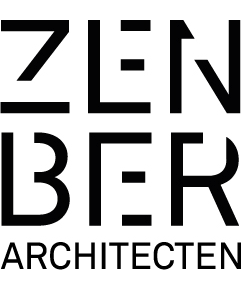What innovative interior design can do for people and organisations
The most important factor in bringing about a smooth transition to a new and different way of working is ensuring there is support for this within the organisation. ZENBER helps achieve acceptance of flexible workplaces by playing a communicative role and applying our experience and creativity. We know how to use innovative interior design to promote a strong and healthy corporate culture, thereby contributing to the success of an organisation.
How do you help create a culture of this kind, with an innovative working environment in which people want to be and stay, but also become inspired to offer the best of themselves? How can innovative interior design stimulate someone’s development and how do you build structures that support their working process, well-being and productivity?
Providing bespoke answers to these questions, in the form of innovative interior designs or advice, is what ZENBER Architecten specialises in.
Flexible workplaces
There are many different reasons for switching to a flexible workplace. The advantages include improved cooperation and greater flexibility for employees. An intelligently designed interior can also connect people, promoting knowledge exchange.
Other reasons are the opportunity of working in a way that is not tied to time and place, and the efficient use of the space within a building (sustainable and cost-cutting). For many organisations, a flexible workplace can be the right step for achieving strategic goals.
As indicated, support, vision and a desire to create are preconditions for implementing a flexible workplace. At ZENBER architects we do not only design interiors, but also consider how we can support an organisation in the process of growth towards acceptance of a flexible workplace.
The identity of both the organisation and individual are reflected in our interior concept. Together with the client, this is further developed in the design phase. No longer having one’s own workplace or room calls for an alternative approach to the aspect of identity. This is why it is important to maintain a connection with the organisation if employees are able to work anywhere. Tempting employees with a pleasant working environment or meeting place is essential in providing the assurance that they will find a community to which they want to belong.
Bespoke approach and support: the Agile strategy
ZENBER is well aware that there is no such thing as a ready-to-use accommodation concept. Every situation and solution calls for a bespoke approach and is therefore unique. In addition, factors such as corporate culture, working processes and ambitions also play a role, alongside the specific physical surroundings. A flexible workplace always calls for an attractive office environment with an identity of its own that shapes the working process in a modern society. People want it, but only if it works for them.
This is why it is so important to have an effective work process analysis that clearly identifies the working methods and needs of the various employees and the organisation. For us, understanding marks the starting point for developing the working concept. By means of workshops, interviews and visits to reference projects, we clearly identify ambitions, desires and requirements before we begin to design.
We always design in close collaboration with the users, since this enables the design dialogue to emerge and widespread support to be achieved within the entire organisation. On many projects, ZENBER also works closely with workplace consultants and accommodation advisers, resulting in an integrated design.
People and working processes take centre stage
For the interior designers at ZENBER, people always come first. This is why our vision of the office environment is always comfortable and inspirational. In order to make a success of a flexible workplace, we believe it to be important to strike the right balance between openness and transparency, as well as between privacy and comfort for employees and guests.
Communication between employees can intensify and productivity can improve through the creation of a blend of dynamic and active zones, such as shared workplaces, and calmer areas, such as lounges and zones for concentration. For the resulting diversity of working environments ZENBER designs the most appropriate experience, atmosphere and functionality.
Sustainability
Sustainability begins with an analysis of the potential for reusing products and materials. The choice of new materials, LED lighting and products is assessed in accordance with a range of sustainability aspects, including production, material composition, the use of local materials and products and the possibility of future reuse. To us, sustainability also implies a timeless design that shows a clear relationship between the building and its intended use within the working environment.
But most importantly, we feel that a working environment must be comfortable and inviting, supporting people in their well-being and their personal development.
If you would like to know more about flexible workplaces, please contact Eric Wezenberg for advice on innovative working environments, free of obligation.
ZENBER has provided consultancy and interior design services for flexible workplaces to clients including:
Nationale Nederlanden | Dutch Association of Insurers | Municipality of Harderwijk | Municipality of Nijmegen | Court of Noord-Nederland | Court of Zeeland – West-Brabant | Head Offices of Croon Wolter & Dros TBI | Head Offices of JP van Eesteren TBI | Dunea Duin & Water Zoetermeer | Wigo4it The Hague | Rabobank Utrecht and region| Rabobank Apeldoorn and region | Rabobank Noordwest-Veluwe | Rabobank Oost Betuwe | Shell Epi Centre, Rijswijk | Boer & Croon, Amsterdam | Directorate-General for Public Works and Water Management (Rijkswaterstaat) & DLG Leeuwarden | Chamber of Commerce, Midden-Nederland | Amsterdam West City Office | Handelsbanken Nederland


